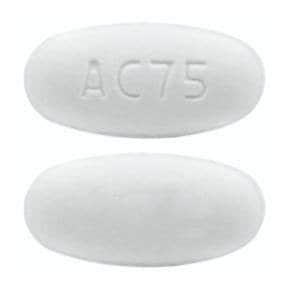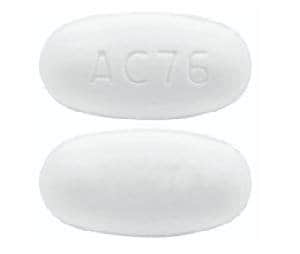What is etravirine used for?
- Etravirine is used to treat HIV infection.
Before taking etravirine, tell your doctor:
For all patients taking etravirine:
- If you are allergic to etravirine; any part of this medicine; or any other drugs, foods, or substances. Tell your doctor about the allergy and what signs you had.
- If you are taking or will be taking another drug like this one.
- If you take any drugs (prescription or OTC, natural products, vitamins) that must not be taken with etravirine, like certain drugs that are used for HIV, infections, or seizures. There are many drugs that must not be taken with etravirine.
- If you are breast-feeding. Do not breast-feed while you take etravirine.
Children:
- If your child is younger than 2 years of age. Do not give etravirine to a child younger than 2 years of age.
This is not a list of all drugs or health problems that interact with etravirine.
Tell your doctor and pharmacist about all of your drugs (prescription or OTC, natural products, vitamins) and health problems. You must check to make sure that it is safe for you to take etravirine with all of your drugs and health problems. Do not start, stop, or change the dose of any drug without checking with your doctor.
What are some things I need to know or do while I take etravirine?
For all patients taking etravirine:
- Tell all of your health care providers that you take etravirine. This includes your doctors, nurses, pharmacists, and dentists.
- Do not run out of etravirine.
- Have blood work checked as you have been told by the doctor. Talk with the doctor.
- This medicine is not a cure for HIV. Stay under the care of your doctor.
- This medicine does not stop the spread of diseases like HIV or hepatitis that are passed through blood or having sex. Do not have any kind of sex without using a latex or polyurethane condom. Do not share needles or other things like toothbrushes or razors.
- This medicine interacts with many other drugs. The chance of side effects may be raised or how well etravirine works may be lowered. Check with your doctor and pharmacist to make sure that it is safe for you to take etravirine with all of your other drugs (prescription or OTC, natural products, vitamins).
- A severe and sometimes deadly reaction has happened. Most of the time, this reaction has signs like fever, rash, or swollen glands with problems in body organs like the liver, kidney, blood, heart, muscles and joints, or lungs. If you have questions, talk with the doctor.
- Use with care in children. Talk with the doctor.
- Tell your doctor if you are pregnant or plan on getting pregnant. You will need to talk about the benefits and risks of using etravirine while you are pregnant.
Children:
- If giving etravirine to your child and your child's weight changes, talk with the doctor. The dose of etravirine may need to be changed.
How is etravirine best taken?
Use etravirine as ordered by your doctor. Read all information given to you. Follow all instructions closely.
- Take after meals.
- Do not take on an empty stomach.
- Swallow whole with some water or other drink.
- Do not chew etravirine.
- You may dissolve tablets in 1 teaspoon (5 mL) of water. Stir until it looks milky and then add about 1 tablespoon (15 mL) of liquid. Water may be used but orange juice or milk may taste better. Do not use carbonated drinks. Drink right away. Rinse cup with more water, orange juice, or milk and drink. This can be done a few times to make sure the full dose has been taken.
- Do not mix etravirine in warm or hot drinks.
- Keep taking etravirine as you have been told by your doctor or other health care provider, even if you feel well.
- It is important that you do not miss or skip a dose of etravirine during treatment.
What do I do if I miss a dose?
- Take a missed dose as soon as you think about it.
- If it is close to the time for your next dose, skip the missed dose and go back to your normal time.
- Do not take 2 doses at the same time or extra doses.
- If you are not sure what to do if you miss a dose, call your doctor.
What are the side effects of etravirine that I need to call my doctor about immediately?
WARNING/CAUTION: Even though it may be rare, some people may have very bad and sometimes deadly side effects when taking a drug. Tell your doctor or get medical help right away if you have any of the following signs or symptoms that may be related to a very bad side effect:
- Signs of an allergic reaction, like rash; hives; itching; red, swollen, blistered, or peeling skin with or without fever; wheezing; tightness in the chest or throat; trouble breathing, swallowing, or talking; unusual hoarseness; or swelling of the mouth, face, lips, tongue, or throat.
- Signs of liver problems like dark urine, feeling tired, not hungry, upset stomach or stomach pain, light-colored stools, throwing up, or yellow skin or eyes.
- Feeling very tired or weak.
- A burning, numbness, or tingling feeling that is not normal.
- Eye irritation.
- Mouth sores.
- Very bad dizziness or passing out.
- Muscle or joint pain.
- Shortness of breath.
- Change in body fat.
- A very bad skin reaction (Stevens-Johnson syndrome/toxic epidermal necrolysis) may happen. It can cause very bad health problems that may not go away, and sometimes death. Get medical help right away if you have signs like red, swollen, blistered, or peeling skin (with or without fever); red or irritated eyes; or sores in your mouth, throat, nose, or eyes.
- Changes in your immune system can happen when you start taking drugs to treat HIV. If you have an infection that you did not know you had, it may show up when you take etravirine. Tell your doctor right away if you have any new signs after you start etravirine, even after taking it for several months. This includes signs of infection like fever, sore throat, weakness, cough, or shortness of breath.
What are some other side effects of etravirine?
All drugs may cause side effects. However, many people have no side effects or only have minor side effects. Call your doctor or get medical help if any of these side effects or any other side effects bother you or do not go away:
- Diarrhea.
These are not all of the side effects that may occur. If you have questions about side effects, call your doctor. Call your doctor for medical advice about side effects.
You may report side effects to the FDA at 1-800-332-1088. You may also report side effects at https://www.fda.gov/medwatch.
If overdose is suspected:
If you think there has been an overdose, call your poison control center or get medical care right away. Be ready to tell or show what was taken, how much, and when it happened.
Etravirine Images
How do I store and/or throw out etravirine?
- Store at room temperature.
- Store in the original container. Do not take out the antimoisture cube or packet.
- Store in a dry place. Do not store in a bathroom.
- Keep lid tightly closed.
- Keep all drugs in a safe place. Keep all drugs out of the reach of children and pets.
- Throw away unused or expired drugs. Do not flush down a toilet or pour down a drain unless you are told to do so. Check with your pharmacist if you have questions about the best way to throw out drugs. There may be drug take-back programs in your area.
Consumer information use and disclaimer
- If your symptoms or health problems do not get better or if they become worse, call your doctor.
- Do not share your drugs with others and do not take anyone else's drugs.
- Some drugs may have another patient information leaflet. Check with your pharmacist. If you have any questions about etravirine, please talk with your doctor, nurse, pharmacist, or other health care provider.
- If you think there has been an overdose, call your poison control center or get medical care right away. Be ready to tell or show what was taken, how much, and when it happened.
This information should not be used to decide whether or not to take etravirine or any other medicine. Only the healthcare provider has the knowledge and training to decide which medicines are right for a specific patient. This information does not endorse any medicine as safe, effective, or approved for treating any patient or health condition. This is only a brief summary of general information about this medicine. It does NOT include all information about the possible uses, directions, warnings, precautions, interactions, adverse effects, or risks that may apply to etravirine. This information is not specific medical advice and does not replace information you receive from the healthcare provider. You must talk with the healthcare provider for complete information about the risks and benefits of using this medicine.





